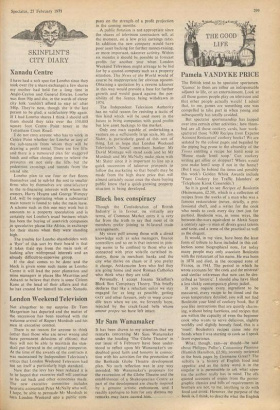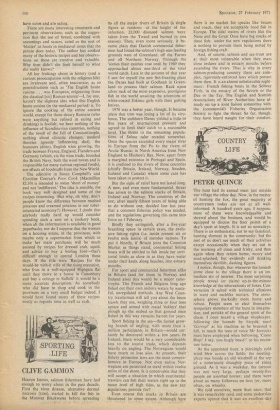THE GOOD LIFE Pamela VANDYKE PRICE
The British tend to be spectator sportsmen. 'Games' to them are either an indispensable adjunct to life, or an entertainment. Look at all those games people play on television and that other people actually watch! I admit that, to me, games are something one was compelled to take part in when young and subsequently has totally- avoided.
But spectator sportsmanship has lapped over into certain other activities: how thum- bed are all those cookery cards, how work- spattered those '6,000 Recipes from Expense Account Restaurant' cookery books? We are sedated by the colour pages and beguiled by the piping bag prose to the absurdity of the Times entitling a recipe for lentil soup as 'Home made lentil soup.' Can cookery writing get sillier or sloppier? Where would you make lentil soup if not in the home? (But I may be behind the times and possibly this week's Golden Whisk Awards include 'Yeast Cookery for Traffic Islanders' or 'Telephone Kiosk Casseroles.') So it is good to see Recipes of Boulestin (Heinemann, £2.50), which is a collection of recipes from the works of a man who was a famous restaurateur (never, strictly, a pro- fessional chef), and a writer for the cook who needs to cook every day (not just for parties). Boulestin was, in some ways, the between-the-wars equivalent to Alexis Soyer a century ago—a man of divers great talents and taste, and a sense of the practical as well as the elegant.
It would, in my view, have been the least form of tribute to have included in this col- lection some biographical note, for today many people may only associate Boulestin with the restaurant of his name. He was born in 1878 and died, in the occupied zone of France, in 1943. The period in which he wrote accounts for 'the cook and the mistress' and similar references that now can be des- cribed as 'historic'. I should also have liked a less slickly contemporary glossy jacket.
If you require every, ingredient to be measured, every recipe to be timed and the oven temperature detailed, you will not find Boulestin your kind of cookery book. But if you like instructions that are quietly charm- ing, without being facetious, and recipes that are within the capacity of even the beginner cook who wants to serve delicious, slightly worldly and slightly homely food, this is a 'must'. Boulestin's recipes came into my hands when I was starting to cook so I speak from experience.
What, though, can—or should—be said about Philippa Pullar's Consuming Passions (Hamish Hamilton, £2.50), recently reviewed in the book pages by Germaine Greer? The subtitle is 'a history of English food and appetite' and as the latter word is in the singular it is permissible to ask what appe- tite the author really has in mind. The oft- quoted accounts of orgies from the porno- graphic classics and bills of requirements in brothels are not, to me, anything to do with food and drink. However, the purpose of the book is, I think, to describe what the English
have eaten and are eating.
There are many interesting comments and pertinent observations, such as the sugges- tion that the use of bread, combined with seasonings and sauces, acted as the sort of 'blotter' to foods in mediaeval times that the potato does today. The author has cooked many of the historic recipes and her observa- tions on these are creative and valuable. Why then didn't she limit herself to what she really knows?
All her friskings about in history (and a curious preoccupation with the religious life) are irrelevant and, often inaccurate; as to generalisations such as 'The English haute cuisine . . . was European, originating from the classical [sic] Roman source'—I, for one, haven't the slightest idea what this English haute cuisine (in the mediaeval period) is. To ignore the cooking of the entire ancient world, except for those dreary Romans (who were anything but refined in eating and drinking) is foolish; we hear nothing of the influence of Scandinavian countries, nothing of the result of the fall of Constantinople, nothing about climatic changes, medical theories (greatly influencing diet), the humours (ditto), English wine growing, the trade between France, England, Flanders and Germany (which, via the wine trade, founded the British Navy, built the wool towns and is responsible for many curious regional foods), nor effects of foodstuffs from the New World.
The adjective in Susan Campbell's and Caroline Conran's Poor Cook (Macmillan £2.10) is intended to mean 'short of money' and not 'indifferent.' The idea is sensible, the book very well designed and some of the recipes interesting. (But why, oh why, don't people know the difference between mashed potatoes and creamed potatoes in our tuber- orientated economy?) However, I doubt that anybody really hard up would consider spending such a sum on a cookery book, when all the information is available in good paperbacks, nor do I suppose that the woman on a housing estate, in the provinces, with maybe only a supermarket from which to make her main purchases will be much assisted by recipes for dressed crab, squid, and advice to buy a boiling fowl—that's difficult enough in central London these days. If the title were 'Recipes for the would-be with-it wife of the rising executive, who lives in a well-equipped Highgate flat until they move to a house in Canonbury and buy a cottage in Suffolk' it would be a more accurate description. As somebody who did have to shop and cook in the provinces on a very small budget indeed, I would have found many of these recipes costly as regards time as well as cash.



































 Previous page
Previous page